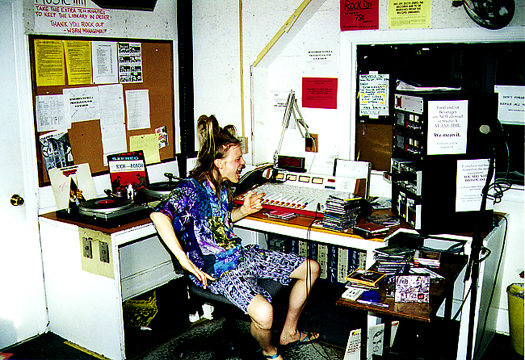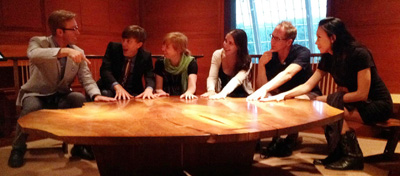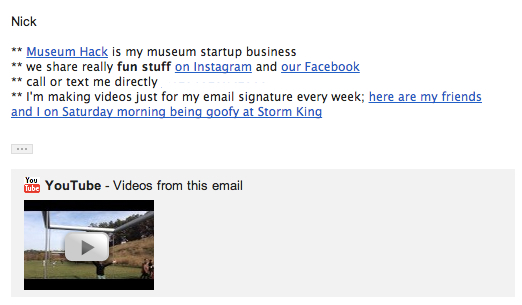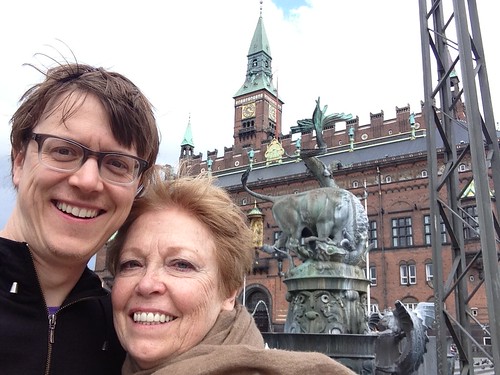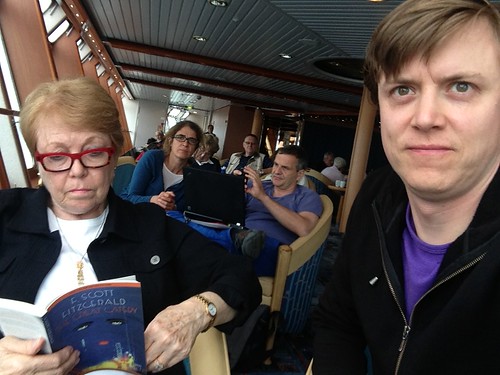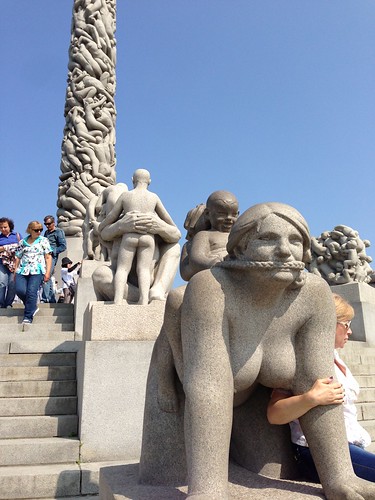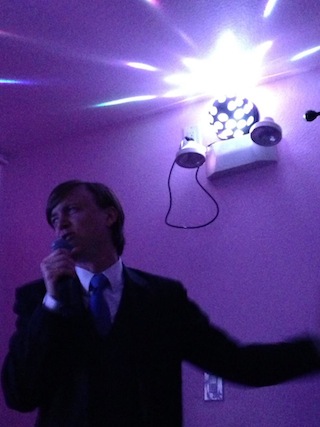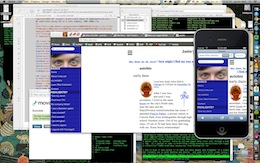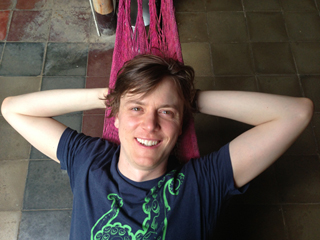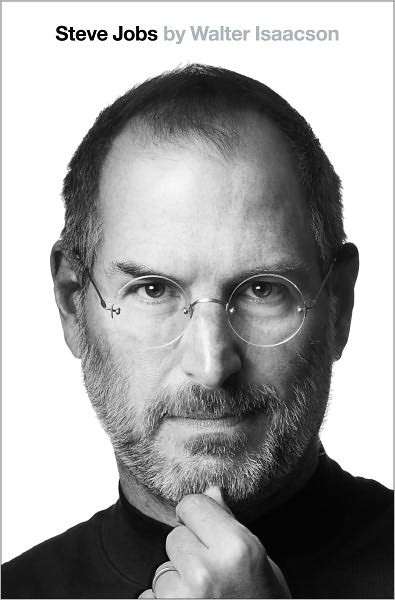 In late October, author Walter Isaacson emailed asking if he could interview me for his new book about the development of the internet. I thoroughly enjoyed Isaacson's 2012 biography of Steve Jobs so I was excited for the opportunity to meet him in conversation.
In late October, author Walter Isaacson emailed asking if he could interview me for his new book about the development of the internet. I thoroughly enjoyed Isaacson's 2012 biography of Steve Jobs so I was excited for the opportunity to meet him in conversation.
During his career, Issacson has worked as a journalist and as management, telling stories and leading news organizations. I wondered, how he struck a balance between independence and working with groups.
Walter Isaacson: Storyteller? Preacher? Manager?
After he interviewed me, I pointed my mobile phone camera at a willing Walter Isaacson for this week's video:
Watch the 5 minute interview on YouTube, Facebook, or Flickr
Tools for Shared Thought
Isaacson's research on the development of the internet reminds me of Howard Rheingold's 1985 book Tools for Thought (Read | Purchase). Tools for Thought hailed the PC as a mind-amplification device, before the internet was a part of our daily lives.
In Tools for Thought, Rheingold's chapter "Johnny Builds bombs and Johnny Builds Brains" was my first exposure to the astonishing life and mind of John Von Neumann. There are amazing characters in the history of computing; Isaacson is likely to feature the likes of Lovelace and Babbage, Turing, Bush and Engelbart, to name a few likely to appear in a few techloving Personal Pantheons.
previewing Isaacson's next book - ATIGT!
Isaacson's Einstein, Franklin and Jobs biographies have hung on a single life experience. Isaacson is now setting out to write a biography of the collaborative internet. I asked Isaacson about the structure for this project during some footage that isn't in the 5 minute cut from our 2nd interview:
Isaacson has a long editing relationship with Alice Mayhew. Mayhew edited his book with Evan Thomas: The Wise Men: Six Friends and the World They Made, about six policymakers who helped set a role for America on the global stage after World War II. The text covered six intersecting lives, and sometimes they would follow the story somewhere, and then have to rewind to catch up with someone.
As Mayhew edited The Wise Men, she wrote ATIGT in the margins. ATIGT - All Things in Good Time. Isaacson brandished that phrase describing this project - employing strict chronology to keep the stories ordered around the timing of the core narrative.
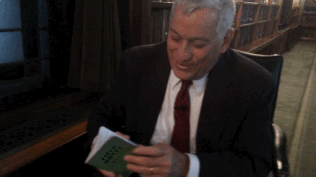
Walter Isaacson shows his shorthand - animated GIF
I asked Walter Isaacson about his own use of technology. Isaacson showed me his Field Notes notebook, inside, his shorthand. Debating media, Isaacson described books as well-suited to linear narrative, while the web he described as more suited to information hunting and gathering. What more he sees in this medium we will have to await in his book, or perhaps keep an eye on Articles by Walter Issacson to get a preview.
media generations
I felt like I was in the middle of an inter-generational narrative relay race: advising a published author on the evolution of online self-expression, as he described the narrative he saw taking shape around human innovation. Isaacson and Rheingold tell me what traditions and genius were leveraged to build the systems I use. I pick up the baton, "hey these tools have great potential to increase collaboration, and these geniuses might show us the way!" Then I tell some of that story here, hoping someone will figure out how to evolve a vision for knowledge sharing for audiences adapted to more responsive media.
The story of the internet is so widespread now; I imagine Isaacson has much gathering and synthesizing ahead of him. Maybe I will end up briefly celebrated by the same bard that celebrated Steve Jobs and Albert Einstein. Walter Isaacson has now been celebrated by the bard that wrestled with Vonnegut, imposed on Burroughs and duped Oliver North.
I had a sustained experience of appearing in writing after Scott Rosenberg made me the subject of the first chapter in Say Everything: a book about blogging. That was a large bit of writing to read about oneself. I have generated piles of text here in this site; so it's not that I'm uncomfortable appearing in print. But it's very different when people tell your story, because they're employing your story to tell another story, which is invariably their own story.
Having a chance to observe the difference between my story and someone else's version of my story has since effected the way I write about other people. There's really no way to know anything about anyone - I aim for well-intentioned description. I can see why people would feel like "Why did that Justin guy make a page about me and say that stuff? He sorta got some stuff right but that other thing is wrong and weird and either way I didn't ask to tell the world that detail about my life."
Scott Rosenberg was a thorough reporter with a good sense of humor, I was fortunate. The people who have appeared on this site, maybe not so fortunate. I got a message a few years ago from my college girlfriend Chandra, my girlfriend in college 1994 when I was 19 and just starting to posting poems here. She didn't totally object to appearing on the new internet, but it wasn't always agreeable to her.
Then in 2011, a mutual college friend Balthazar died, and Chandra contacted me via Facebook with this note:
For some reason my mind flashed on Balthazar (remember him?). Like any person living in the here and now, I embarked on internet research to satisfy my curiosity. One picture of him exists online, one you took 17 years ago and posted on your "links." So, for the first time, I feel grateful to these "links" that I often scorned because I feel the beauty of recording life since it can slip away so suddenly. ... every person deserves a certain honoring of their existence. After almost two decades, I wanted to thank you for that service. I am glad to be able to see an image of Balthazar.
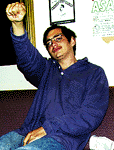 I may never receive a nicer commendation for my web work than Chandra writing 'So, for the first time, I feel grateful to these "links" that I often scorned because I feel the beauty of recording life since it can slip away so suddenly.' It was humbling to receive that full circle affirmation.
I may never receive a nicer commendation for my web work than Chandra writing 'So, for the first time, I feel grateful to these "links" that I often scorned because I feel the beauty of recording life since it can slip away so suddenly.' It was humbling to receive that full circle affirmation.
I'm still writing, and making personal media. Maybe now if someone complains about appearing on my page, I can say, "sorry, I got ahead of myself fashioning you an online gravestone."
All over this global square of proclaiming, us into screens, at each other - in 200 years few people will be remembered, even people who win awards and make famous things. It's somewhat reassuring to remember that all the public thinking I can ever do is in service of some unknowable objective that will never be accomplished. Hah!
Manager?
Isaacson described himself as a storyteller who had a stint in management and come back to focus on storytelling. Telling a resonant story is a key part of leading a group. Perhaps I should have asked Isaacson whether he's more of a leader or a loner - I met him as a biographer, but he also runs a think tank so he's a loner who at least hosts conversations.
This again reminds me of Howard Rheingold - a writer and editor who ran a business and then back to being a writer. Rheingold spends most of his time alone, but he's constantly conversing with people around the world, even running Rheingold University out of his office.
I last worked in an office in June 2013. Five months since I was in a group productivity environment and I can see the shape of my self-directed time. Simple breakfast and water, computing until mid-afternoon, errands or walking, dinner or socializing, more work and bed. I am happy at home - never cafes. I spend most of my "work" time alone communicating with people. I love following up on my own questions, and being able to follow through on collaborations with friends.
I went from journalist to CEO, then Director at a large organization, to Experimental Evangelist. Not bad for a guy who exposed himself to the internet. I acted crazy, and shared it publicly, which was perhaps crazier, and I've still emerged semi-employable. Not sure what I'll end up doing tomorrow, except probably thinking about my dad. For a change!
Father Time
Thursday 14 November 2013 is 30 years since Wesley Hall my father killed himself. When I was a teenager, I set aside hours each 14 November. I went into a room with a window in my school library to summon anger, stare off at the bare branches in the distance, cry and write poems. I had some serious reckoning to do with a self-kilt dead man.
Now that 30 years have passed, that tragedy has grown smaller in my life. I've lived through the death of another father, one I was glad to know for over two decades: my stepfather George, who passed away at 90 surrounded by loving family. My father shot himself at 58 after struggling with anger and alcohol. I have now lived through these two fathers.
And I've had fathery moments with Howard Rheingold for twenty years. Obviously Howard has left an impression on me, if only judging from how many pixel-inches of text I spent on him above. Howard got cancer and survived in 2010; I watched him stare death in the face, recover and now seize every chance to make things.
I'm grateful for the chance to evolve deep relationships with my family and friends. I'm sad I couldn't have that chance with my biological Dad. I'm grateful so many men and women stepped in to support me, give me good stories and enable me to tell my own.
My Dad has diminished as a tormentor. A few years ago I would have said divorce, combined with George's death and a feeling of mortality were my real tormentors, but I survived them too! I can't imagine what's next. If I'm lucky enough to live to see it! Whew.
Congratulations, Mom
When Isaacson emailed me last month, I remembered I had met him once before, when he was at Time Magazine and I believe I was getting a tour from a journalist. Time had launched Pathfinder, a rival online magazine to HotWired. In 1995 there weren't many professional sites online; we had a brief exchange on the subject.
So when he emailed me I mentioned that I would be in New York, where I remembered meeting him last. Fortunately he was going to be there too, so we were able to do this interview in person. I sprang the idea on him during our conversation and Issacson assented without hesitation, for which I'm grateful.
I was in New York because my Mom won a lifetime achievement award from American Lawyer magazine. When I think about my relationship to all these fathers I think about my Mom there too. I was upset at her when I was young, because she was so focused on her work, she didn't linger at home.
Now I understand her better, and I can see her as a role model. I'm grateful for the life she's passing on to me. I love work I enjoy, and I enjoy a range of work. I wonder how I would balance being a loner, a leader and a parent. I haven't yet been a father, so I don't know how I would answer the question I posed as a teary young man staring out the window, asking my dad "how could you leave me?"
Process Notes
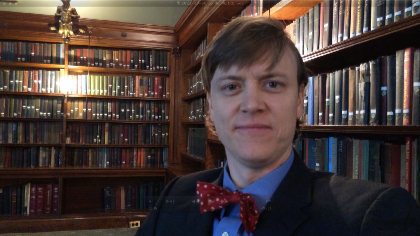
I recorded the interview with my iPhone 5s, using a $20 lavalier mic with an iPhone-XLR adapter. I held the phone with a Joby GorillaPod stand - easier to grip for 13 or so minutes.
I didn't think to film myself asking the questions, so for the edit, while I'm talking I use brief clips of my face that I fortunately filmed as part of my introduction. That was a trick I came up with for my Nick Gray video which I shot with the same setup the day before Walter Isaacson, but edited the week after.
This interview was filmed on 30 October at the Metropolitan Club in New York City. Between the library setting, and the literary themes, Chamber music seemed like the most fitting soundtrack. Fortunately, my recent go-to for royalty free music, the Free Music Archive, hosts the Advent Chamber Orchestra which had a number of lovely selections. I chose their rendition of Handel's "Entrance to the Queen of Sheba for Two Oboes, Strings, and Continuo allegro" for the opener. Then Bach's Brandenburg Concerto No 3, 1 allegro to close it out.
I made the video exactly 4 minutes, 58 seconds, and 29 frames, so I could get my video listed as 4.59 (not 5 minutes). Alas, YouTube lists it as 5 minutes. Oh well - I cut things too close. I believe the pricing for goods that says 4.99 is more persuasive than 5; I suspect the same is true when people are deciding whether to watch a video. I'm honored you might watch that video, and/or have read this far!
